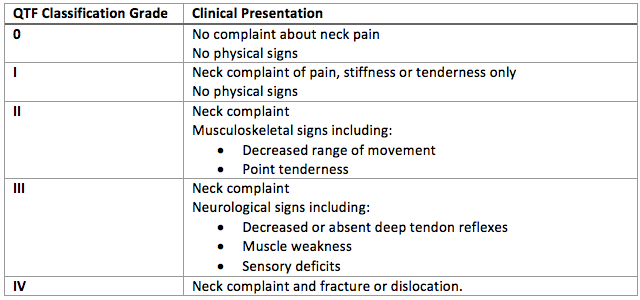David Goulding
Whiplash Associated Disorders (WAD) are defined as soft tissue injuries that result from “an acceleration-deceleration mechanism of energy transfer to the neck” (Pastakia & Kumar, 2011). These types of injuries are most commonly seen as the result of rear-end or side- impact motor vehicle accidents but can also occur through other circumstances.
Whiplash can be classified into five separate categories according to the Quebec Task Force (Spitzer et al, 1995). These are as follows:
Worryingly, around 50% of people who sustain a WAD will not recover and will continue to report ongoing pain and disability one year after the injury (Sterling, 2014).
Given the high level of persistent pain following WAD injuries, there has been a large amount of research dedicated to determining what predicts a poor outcome. Through this work it has consistently been found that higher levels of initially report pain (>5.5 on VAS) and higher levels of initially reported disability (NDI > 29%) are related to poor recovery. As such, these factors are important to assess in the early stages following a whiplash injury (Sterling, 2014).
In addition, it has also been found that psychological factors such as moderate post-traumatic stress symptoms, pain catastophising and depressed mood indicate a poor outcome. It is little surprise then that 25% of persistent WAD cases have PTSD and 31% have a major depressive disorder (Sterling, 2014).
Finally, it has also been found that low expectation of recovery and objective signs of central sensitisation are risk factors for poor outcome (Sterling, 2014).
It is worth considering these factors when managing any patient who presents with a Whiplash Associated Disorder. In the event that a patient does not respond well to a uni-modal physiotherapy approach, it is worth considering a referral onto a multi-disciplinary pain management program such as the one at Advance Healthcare. The multi-disciplinary team is well equipped to manage the psychological, functional and neurophysiological factors which may be acting as barriers to recovery.
David graduated from the University of Melbourne with a Bachelor of Physiotherapy in 2000. He has worked primarily in the field of chronic pain ever since. His passion for delivering quality evidence based physiotherapy led him to completing a Masters in Musculoskeletal Physiotherapy in 2013. In addition, David is due to finish a Post Graduate Certificate in Pain Management from the University of Sydney in 2016.
David has lived in Geelong and worked with the Corio Bay Health Group for the past 10 years.
In addition to his Clinical role, David also works as a physiotherapy consultant to the TAC one day a week.
References
· Pastakia, K., & Kumar, S. (2011). Acute whiplash associated disorders (WAD). Open Access Emergency Medicine: 3, 29-32.
· Spitzer, W., Skovron, M., Salmi, I., Cassidy, J., Duranceau, J., & Suissa, S. (1995). Scientific monograph of Quebec Task Force on Whiplash associated disorders: redefining “whiplash” and its management. Spine:20 (8 suppl), 1S-73S.
· Sterling, M. (2014). Physiotherapy management of whiplash-associated disorders (WAD). Journal of Physiotherapy: 60, 5-12.



